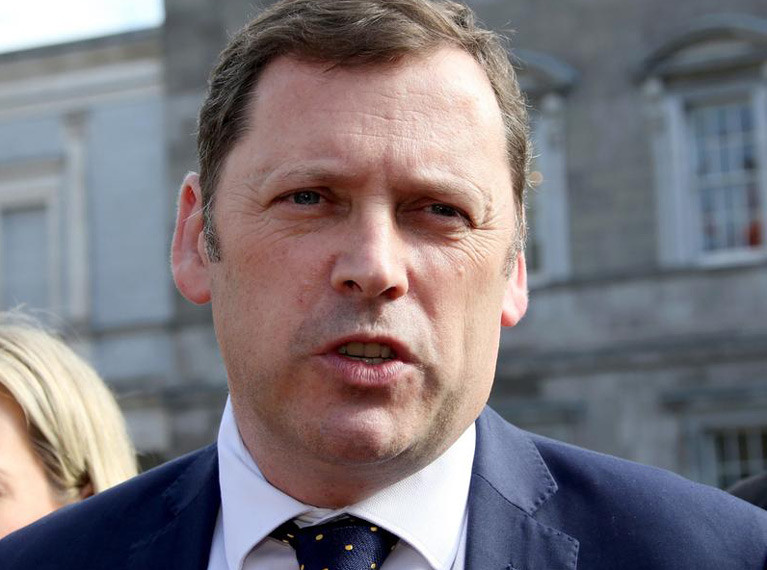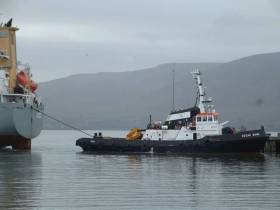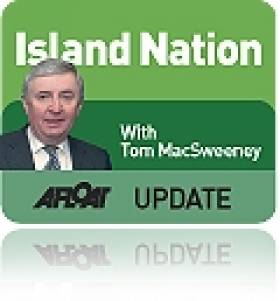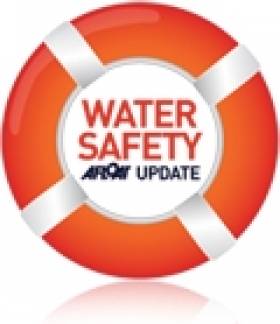Displaying items by tag: Department of the Marine
Barry Cowen is New Minister for the Marine
Barry Cowen (52) is the new Minister for the Marine. A brother of a former Taoiseach, the Laois-Offaly TD will get a chance to sit at Cabinet following nine years on the party frontbenches. Cowen's work and party pedigree make him vital to new Taoiseach Michéal Martin, bringing with him large parts of the Fianna Fail party.
In the last Dáil, Cowen was Fianna Fail’s spokesperson on Public Expenditure and Reform. An auctioneer and valuer by trade, the incoming member of cabinet is from Clara, Co. Offaly.
The new minister was previously Fianna Fáil’s spokesperson on Environment and Local Government in July 2012 and party spokesperson on Social Protection in March 2011.
Minister Cowen was first elected to Dáil Éireann in 2011 following the retirement of his brother – former Taoiseach Brian Cowen.
He was a member of Offaly County Council between 1991 and 2011 and acted as chairman of Offaly County Council from 2000 to 2001.
Minister of Sport
Of significance to the Irish sailing scene will be the appointment of Minister of Sport, Green TD Catherine Martin (47) from Dublin Rathdown.
Eamon Ryan is the Minister for Climate Action and Transport with a massive offshore wind energy programme in prospect.
Maritime Transport
Super junior minister appointments include Galway's Hildegarde Naughton (43) with the Maritime Transport portfolio and the appointment of Heather Humphreys (57), as Minister for Social Protection and Rural Affairs.
The new Taoiseach has announced his cabinet in full, which comprises:
- Tánaiste – Leo Varadkar;
- Minister for Climate Action and Transport – Eamon Ryan;
- Minister for Finance – Paschal Donohoe;
- Minister for Public Expenditure and Reform – Michael McGrath;
- Minister for Foreign Affairs – Simon Coveney;
- Minister for Agriculture and Marine – Barry Cowen;
- Minister for Justice – Helen McEntee;
- Minister for Health – Stephen Donnelly;
- Minister for Social Protection – Heather Humphreys;
- Minister for Education – Norma Foley;
- Minister for Children and Disability – Roderic O’Gorman;
- Minister for Housing – Darragh O’Brien;
- Minister for Media, Tourism, Art, Culture, Sport and the Gaeltacht – Catherine Martin;
- Minister for Higher Education, Innovation and Research – Simon Harris;
- Attorney General – Paul Gallagher;
- Chief Whip – Dara Calleary.
I’m wondering why Government officials, the civil servants, don’t listen to advice from people who know more than they do about the maritime sphere…..
Two issues which cause concern are the contradictory attitude of the Department of the Marine which, on the one hand proclaims the importance of the blue economy and pushes the Ocean Wealth Plan as evidence of its maritime commitment, but on the other hand – denies that fish in Irish waters are a natural resource which Ireland owns … Hard to believe perhaps, but that is what the Department has said and a leading maritime lawyer challenges it, as you’ll hear on the Podcast.
The second issue is maintaining the communities on our offshore islands where there is a belief that the Government is not helping sufficiently … President Higgins agrees with them and in the Podcast you’ll hear the Islands’ Federation point to the success of WIORA held on the Aran Islands and a shipping achievement for Bere Island as evidence of what the islands can do.
Listen to the Podcast here
'In the Wealth of the Sea Lies Our Hope' So Where is Ireland's Department of The Marine?
#marine – The Irish Maritime Administration (IMA) was established in 2013 to integrate the planning and delivery of all the maritime services of the Department of Transport, Tourism and Sport under a single national office.
The Department's website describes this as "central" to its "drive for more efficient and effective delivery of maritime services."
It is comprised of the Maritime Safety Policy Division, the Marine Survey Office, the Irish Coast Guard, the Maritime Transport Division and the Maritime Services Division.
The IMA, declares the Departmental website, "is developing the maritime transport sector, by facilitating the achievement of international safety levels and by enhancing infrastructure needed to secure employment in the shipping, fishing and leisure sectors."
This weekend The Irish Times reported, in the context of political appointments to State bodies, that the former Minister for Transport, Leo Varadkar, appointed three people without any sea-going experience to the Marine Casualty Investigation Board.
This story has not been denied. The appointments have been defended with the explanation that they were "ensuring that there could be no conflict of interest," according to a Department spokesman. The Irish Times claimed that there was only one member of the Board who had direct marine expertise for the past year.
"No conflict of interest," what exactly does that mean in the context of investigations into marine accidents? The importance of seafaring skills or maritime experience was not highlighted in the quoted explanation from the Department.
The MCI, it seems, uses contracted experts into marine casualties whose reports are submitted to the Board.
The integrity of the individuals concerned is not at issue but it is relevant to ask why this board has had only one member with direct marine expertise.
Is the Department of Transport the correct place for maritime matters?
Moving them into that Department facilitated Government policy which is against the existence of a dedicated Department of the Marine and keeps maritime affairs at a low level in State administration.
Prior to the last General Election both Coalition parties, Fine Gael and Labour, promised a single department to deal with maritime affairs. There was hope for a Department of the Marine again being created. Unsurprisingly, once they got into Government that did not happen. Marine was lumped in with Agriculture, Food and now Defence and aspects such as maritime safety and the ports went to the Department of Transport. Other parts of the maritime brief were put into other Departments, such as Communications and Energy and some seemed to have been lost altogether!
The Government, politicians and officials under the leadership of Taoiseach Enda Kenny, who has several times highlighted his maritime heritage in public, did not see maritime affairs as important enough to merit a full department in an island nation, a country where 95 per cent of exports and imports depend upon the sea.
When he was appointed Minister for Agriculture, Food and the Marine, Simon Coveney, who does have a commitment to maritime affairs, declared that he wanted the maritime aspect of his brief and his title as Minister for the Marine to be publicly recognised. He also indicated his desire to have all maritime matters brought under his department. That did not happen. The Department of Transport strengthened its grasp on aspects of maritime affairs. The establishment of the Irish Maritime Administration within the Department of Transport last year was a further attempt, in my view, to frustrate any possibility of the building up of a strong Department of the Marine.
Several years ago, when Marine Correspondent with RTE, I noted the strong representations a number of ports and exporters to be have them moved out of the then Department of the Marine and into Transport. There was public and private lobbying through the Ports Association and other bodies. It was maintained that Transport would give the ports and all involved with them a stronger position nationally. It seemed that the marine department was regarded as too lowly within governmental structure.
I once sat in the office of a senior politician in Dublin who, under a previous Government administration, had been appointed Minister for the Marine at a time when Ireland had such a dedicated Department. He had waxed lyrical about his family's political tradition and then told me that he was stuck with being the 'minister for fish and ships' but he would have to 'suffer for a while' with that indignity until he could get a more senior post. The man filled me with disgust, but his attitude was indicative of many Irish politicians who have shown little respect for the marine sphere of a nation which has produced mariners of international renown.
The marine sector is so diffused now that it does not have the power or political clout which it merits. That the government has advanced plans such as Ocean Wealth as a means of driving maritime development, does not counteract the lack of a single maritime department. This is not good for maritime affairs in an island nation where they should be a priority.
I have been considering all of these points and others following the inaugural Irish Maritime Forum held at Cork City Hall. It was well-organised by Cork Port, with sponsorship from Liebherr, the German crane manufacturer based in Killarney. There was a big attendance. The presentations were accompanied by the usual audio-visual displays, all aimed "at organisations and professionals within the maritime industry in Ireland" The promotional brochure said: "This forum will look at 'Developing the dynamic future of Ireland's Maritime Sector' by exploring the ocean of opportunities that exist within the sector and concentrating on the key drivers that are set to change the sector in the future. Breakout sessions will explore further the drivers of change within the transport sector and the opportunities and challenges that exist. The forum will provide a unique platform of national and international speakers each bringing their own expert knowledge and experience to the forum."
"Key drivers of change... dynamic future... breakout sessions...." nicely-put management and marketing 'speak' ... There were good presentations, ideas suggested and, it was interesting to hear from international speakers of practices and developments, based on their experience.
There is not a shortage of maritime-themed conferences. What do they practically achieve?
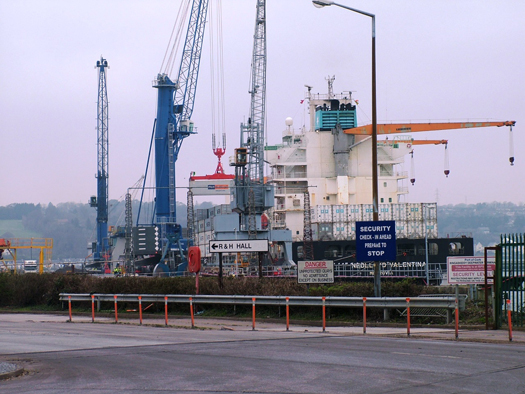
Containers unloading at the Port of Cork. Cork has already begun using the existing deepwater port at Ringaskiddy to ship containers
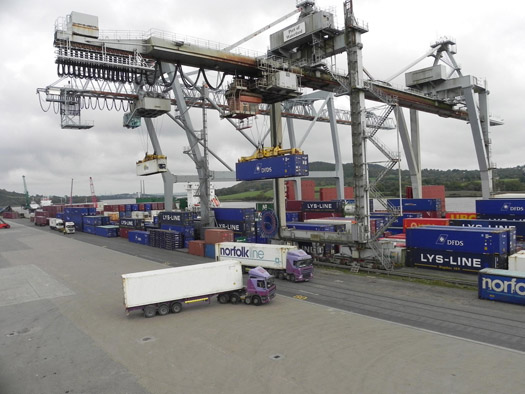
Waterford Port's dedicated container terminal at Belview. The port opposes Cork's attempt to build a new container port at Ringaskiddy
Ireland's major ports compete with each other, which suits the Government that seeks to avoid financial responsibility for them. So you have situations such as where Cork Port wants to build a container port in the lower harbour at Ringaskiddy, which Waterford Port, having developed its own container port at Belview outside the city, opposes at a planning hearing. Galway wants to develop a major port facility, claiming the Western coastline should have modern port facilities and attract more cruise ships. Other major ports are lobbying against this and being both critical and dismissive. Dun Laoghaire also wants a future in cruise liner visits. Dublin Port is less than happy with this. Cork claims to have the only dedicated cruise line terminal in the country, but as was stated at the Cork maritime conference, cruise shipping operators have no loyalty to any port and will go only where the best deals are offered to them, to cut their costs as much as possible.
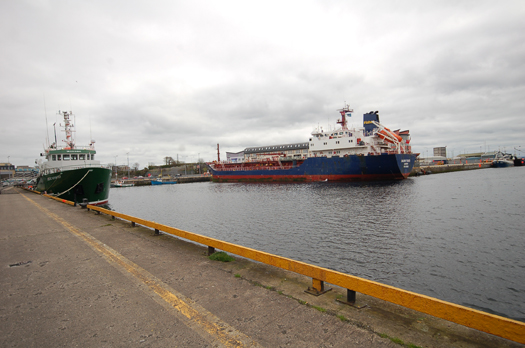
Galway wants to build a new port
While Dun Laoghaire is a major leisure marine centre, its Harbour comes in for strong criticism in the survey of the Irish Cruiser Racing Association into this year's national championships held there. The criticism focusses on what the ICRA report describes as the insistence on charging marina fees to visiting boats, something never done at other championship events around Ireland to participating boats, an attitude which visitors found unhelpful and discouraging.
If all maritime affairs were concentrated in one Department it would make them a priority in this island nation. They include and range across all aspects of the nation's life, from the sea around us, to the inland waterways, the ports, energy creation from marine sources, the fishing industry, angling, marine tourism, history, culture, all are part of a nation where people first came to the coastal areas some 9,000 years ago.
A Department of the Marine should be a leading, top-level Department of Government in this island nation. It would be economically important, could create employment, could drive development across a wide range of activities with benefit to the nation. Instead, narrow-minded, self-centred thinking and lack of foresight continues to restrict the progress of maritime affairs, causes duplication of effort and keeps marine affairs at a low national level.
I like the motto of Arklow, that County Wicklow coastal town with a great maritime tradition. As Gaeilge it reads: "Maoin na Mara are Muighin," which translates to: "In the wealth of the sea lies our hope."
That motto came to my mind at Cork City Hall, as I listened to the speeches and questions at the Irish Maritime Forum, but even that title raised the issue of duplication. It was chosen, as far as I remember, as the title for an organisation established a few years ago, by a group of mariners who formed - The Irish Maritime Forum.
Until next week, the usual wish of ..... "fair sailing" ........
Twitter: @Tom MacSweeney
Fatality Rate for Fishermen An 'Absolute Tragedy'
Fishermen and farmers make up more than half of all work-related fatalities in Ireland, according to the Minister for the Marine.
As The Irish Times reports, Simon Coveney TD decried it as an "absolute tragedy" in the Dáil.
He noted the progress being made in encouraging people to wear safety gear when on the water, but said there was "little or no progress in getting fishermen to wear lifejackets”.
"For some reason fishermen seem to think they will never fall in the water," the minister commented.
Cork South West TD Noel Harrington also raised the point of the Department of the Marine's refusal to use personal beacons that directly signal emergency services, rather than emergency position indicating radio beacons (EPIRB).
He referred to the capsizing of the Rambler 100 yacht in the Fastnet Race in August, saying that the latter did not go off to alert the coastguard as the boat had not sunk.
Labour Manifesto Leads the Way on Irish Maritime Affairs
Fine Gael has told Afloat.ie details of its marine policy will be published in its manifesto tomorrow. If that's the case things are looking up for anyone interested in seeing Ireland develop the valuable waters that surround it.
After searching for references to 'sea', 'marine' or 'maritime' only the Labour party has so far made the only significant written commitment to the marine sector in its programme for government. Its manifesto acknowledges that Coastal Communities, Fisheries and the Marine face major challenges in the years ahead, but it is also an area of major economic potential.
Fianna Fail merely says on page 21 of its manifesto that it will ensure that 'an inter-departmental strategy is in place to improve the leisure potential of our harbours and increase marine tourism'.
The Green Party 'Renewing Ireland' document says it will promote the creation of marinas and youth and child friendly water sports to encourage activity and awareness of our maritime country. It also says Ireland will participates in the North Seas Offshore Grid Plan.
There is no reference to the marine in the Sinn Fein 'There is a Better Way' manifesto.
Four party manifestos are available to download below.
Labour's priority will be to develop Ireland as a European hub for seafood processing, which will create sustainable, value-added jobs in coastal communities.
Labour will also develop an Irish seafood strategy to grow the market profile and demand for Irish seafood products. We will support the development of sustainable aquaculture and fish farms by streamlining the licensing process and reducing, as much as possible, the associated bureaucracy. To further assist the development of the sector, responsibility for maritime policy will, as far as is practicable, be concentrated in one department.
Labour will establish a Sea Fisheries Sustainability Impact Assessment based on consultation with all major stakeholders. This report will be brought before the Dáil on an annual basis before EU fisheries negotiations commence, and will ensure that there is a regular evaluation of Irish fish stocks and the effectiveness of current policy and quotas.
Labour is open to the experience and expertise of those whose livelihoods depend on maritime activity. The Department of Agriculture, Fisheries and Food will engage in an ongoing structured consultation with industry representatives, the marine scientific community and other stakeholders to enable them to contribute to national maritime policy.
Finally, safety at sea and decent working conditions must underpin the development of the fisheries sector. Labour in government will ensure that the Irish Coast Guard has access to an Emergency Towing Vessel.
Dun Laoghaire People before Profit candidate Richard Boyd Barrett who has campaigned under a 'Save our Seafront' banner in the last council elections, is holding a meeting tomorrow night in Dun Laoghaire, the country's largest boating centre to protest against the possible 'privatisation' of the town's harbour.
We're tracking the progress of maritime affairs in the general election and posting details on afloat.ie. Whether you're a candidate or a vote please get in touch with your #ge11 marine news. Contact us via facebook, twitter or our website.
Ferry Firm Challenges Marine Dept in High Court
An Aran Islands ferry company is currently battling the Department of the Marine in the High Court over charges for the use of Rossaveal Harbour, the Galway Advertiser reports.
Island Ferries Teoranta claims that harbour fees have risen eight-fold since 2003, saying they are "unreasonable, discriminatory and unrelated to the cost of running the harbour".
The company, run by Paddy O'Brien and family, said it received a bill of more than €200,000 in mid-2005, compared to annual bills of around €23,000 in previous years, and claims that one of its vessels was wrongfully detained when it refused to pay.
Irish Ferries has also accused the Government of breaking EU competition law over its monopoly on the provision of harbour facilities.
The High Court hearings continue.


























